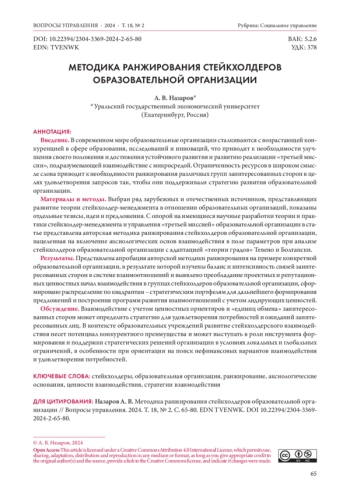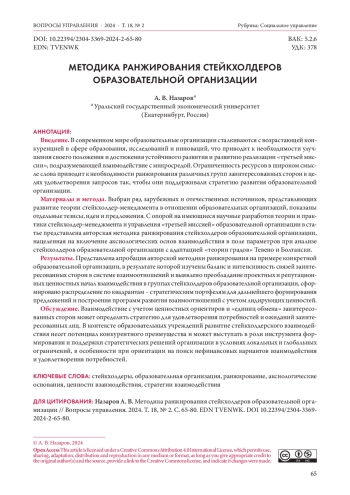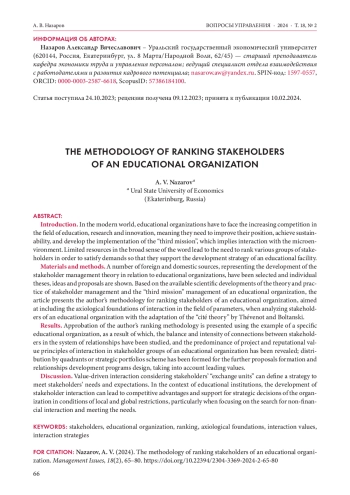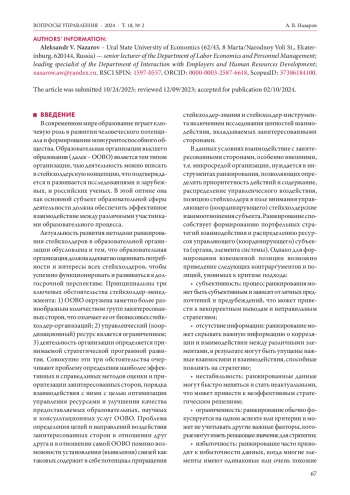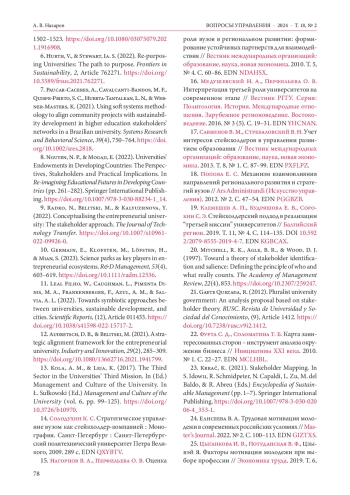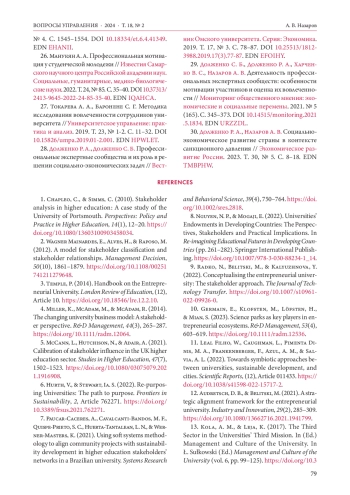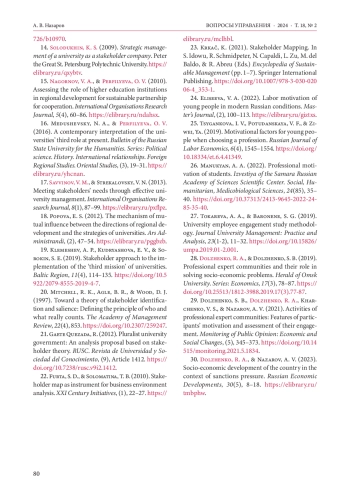Введение. В современном мире образовательные организации сталкиваются с возрастающей конкуренцией в сфере образования, исследований и инноваций, что приводит к необходимости улучшения своего положения и достижения устойчивого развития и развитию реализации «третьей миссии», подразумевающей взаимодействие с микросредой. Ограниченность ресурсов в широком смысле слова приводит к необходимости ранжирования различных групп заинтересованных сторон в целях удовлетворения запросов так, чтобы они поддерживали стратегию развития образовательной организации.
Материалы и методы. Выбран ряд зарубежных и отечественных источников, представляющих развитие теории стейкхолдер-менеджмента в отношении образовательных организаций, показаны отдельные тезисы, идеи и предложения. С опорой на имеющиеся научные разработки теории и практики стейкхолдер-менеджмента и управления «третьей миссией» образовательной организации в статье представлена авторская методика ранжирования стейкхолдеров образовательной организации, нацеленная на включение аксиологических основ взаимодействия в поле параметров при анализе стейкхолдеров образовательной организации с адаптацией «теории градов» Тевено и Болтански.
Результаты. Представлена апробация авторской методики ранжирования на примере конкретной образовательной организации, в результате которой изучены баланс и интенсивность связей заинтересованных сторон в системе взаимоотношений и выявлено преобладание проектных и репутационных ценностных начал взаимодействия в группах стейкхолдеров образовательной организации, сформировано распределение по квадрантам - стратегическим портфелям для дальнейшего формирования предложений и построения программ развития взаимоотношений с учетом лидирующих ценностей.
Обсуждение. Взаимодействие с учетом ценностных ориентиров и «единиц обмена» заинтересованных сторон может определить стратегию для удовлетворения потребностей и ожиданий заинтересованных лиц. В контексте образовательных учреждений развитие стейкхолдерского взаимодействия несет потенциал конкурентного преимущества и может выступать в роли инструмента формирования и поддержки стратегических решений организации в условиях локальных и глобальных ограничений, в особенности при ориентации на поиск нефинансовых вариантов взаимодействия и удовлетворения потребностей.
Идентификаторы и классификаторы
В современном мире образование играет ключевую роль в развитии человеческого потенциала и формировании конкурентоспособногообщества. Образовательная организация высшего образования (далее – ООВО) является тем типом организации, чью деятельность можно вписать в стейкхолдерскую концепцию, что подтверждается и развивается исследованиями и зарубежных, и российских ученых. В этой оптике она как основной субъект образовательной сферы деятельности должна обеспечить эффективное взаимодействие между различными участниками образовательного процесса.
Список литературы
1. Chapleo, C., & Simms, C. (2010). Stakeholder analysis in higher education: A case study of the University of Portsmouth. Perspectives: Policy and Practice in Higher Education, 14(1), 12-20. DOI: 10.1080/13603100903458034
2. Wagner Mainardes, E., Alves, H., & Raposo, M. (2012). A model for stakeholder classification and stakeholder relationships. Management Decision, 50(10), 1861-1879. DOI: 10.1108/00251741211279648
3. Temple, P. (2014). Handbook on the Entrepreneurial University. London Review of Education, (12), Article 10. DOI: 10.18546/lre.12.2.10
4. Miller, K., McAdam, M., & McAdam, R. (2014). The changing university business model: A stakeholder perspective. R&D Management, 44(3), 265-287. DOI: 10.1111/radm.12064
5. McCann, L., Hutchison, N., & Adair, A. (2021). Calibration of stakeholder influence in the UK higher education sector. Studies in Higher Education, 47(7), 1502-1523. DOI: 10.1080/03075079.2021.1916908 EDN: LYQVYN
6. Hurth, V., & Stewart, Ia. S. (2022). Re-purposing Universities: The path to purpose. Frontiers in Sustainability, 2, Article 762271. DOI: 10.3389/frsus.2021.762271
7. Paucar-Caceres, A., Cavalcanti-Bandos, M. F., Quispe-Prieto, S. C., Huerta-Tantalean, L. N., & Werner-Masters, K. (2021). Using soft systems methodology to align community projects with sustainability development in higher education stakeholders’ networks in a Brazilian university. Systems Research and Behavioral Science, 39(4), 750-764. DOI: 10.1002/sres.2818 EDN: XBOIPO
8. Nguyen, N. P., & Mogaji, E. (2022). Universities’ Endowments in Developing Countries: The Perspectives, Stakeholders and Practical Implications. In Re-imagining Educational Futures in Developing Countries (pp. 261-282). Springer International Publishing. DOI: 10.1007/978-3-030-88234-1_14
9. Radko, N., Belitski, M., & Kalyuzhnova, Y. (2022). Conceptualising the entrepreneurial university: The stakeholder approach. The Journal of Technology Transfer. DOI: 10.1007/s10961-022-09926-0
10. Germain, E., Klofsten, M., Löfsten, H., & Mian, S. (2023). Science parks as key players in entrepreneurial ecosystems. R&D Management, 53(4), 603-619. DOI: 10.1111/radm.12536 EDN: VHNOHC
11. Leal Filho, W., Caughman, L., Pimenta Dinis, M. A., Frankenberger, F., Azul, A. M., & Salvia, A. L. (2022). Towards symbiotic approaches between universities, sustainable development, and cities. Scientific Reports, (12), Article 011433. DOI: 10.1038/s41598-022-15717-2
12. Audretsch, D. B., & Belitski, M. (2021). A strategic alignment framework for the entrepreneurial university. Industry and Innovation, 29(2), 285-309. DOI: 10.1080/13662716.2021.1941799 EDN: EQZDBD
13. Kola, A. M., & Leja, K. (2017). The Third Sector in the Universities’ Third Mission. In (Ed.) Management and Culture of the University. In Ł. Sułkowski (Ed.) Management and Culture of the University (vol. 6, pp. 99-125). DOI: 10.3726/b10970
14. Солодухин К. С. Стратегическое управление вузом как стейкхолдер-компанией: Монография. Санкт-Петербург: Санкт-Петербургский политехнический университет Петра Великого, 2009. 289 с. EDN: QXYBTV
Solodukhin, K. S. (2009). Strategic management of a university as a stakeholder company. Peter the Great St. Petersburg Polytechnic University. EDN: QXYBTV
15. Нагорнов В. А., Перфильева О. В. Оценка роли вузов в региональном развитии: формирование устойчивых партнерств для взаимодействия // Вестник международных организаций: образование, наука, новая экономика. 2010. Т. 5, № 4. С. 60-86. EDN: NDAHSX
Nagornov, V. A., & Perfilyeva, O. V. (2010). Assessing the role of higher education institutions in regional development for sustainable partnership for cooperation. International Organisations Research Journal, 5(4), 60-86. EDN: NDAHSX
16. Медушевский Н. А., Перфильева О. В. Интерпретация третьей роли университетов на современном этапе // Вестник РГГУ. Серия: Политология. История. Международные отношения. Зарубежное регионоведение. Востоковедение. 2016. № 3 (5). С. 19-31. EDN: YHCNAN
Medushevsky, N. A., & Perfilyeva, O. V. (2016). A contemporary interpretation of the universities’ third role at present. Bulletin of the Russian State University for the Humanities. Series: Political science. History. International relationships. Foreign Regional Studies. Oriental Studies, (3), 19-31. EDN: YHCNAN
17. Саввинов В. М., Стрекаловский В. Н. Учет интересов стейкхолдеров в управлении развитием образования // Вестник международных организаций: образование, наука, новая экономика. 2013. Т. 8, № 1. С. 87-99. EDN: PXFLPZ
Savvinov, V. M., & Strekalovsky, V. N. (2013). Meeting stakeholders’ needs through effective university management. International Organisations Research Journal, 8(1), 87-99. EDN: PXFLPZ
18. Попова Е. С. Механизм взаимовлияния направлений регионального развития и стратегий вузов // Ars Administrandi (Искусство управления). 2012. № 2. С. 47-54. EDN: PGGBZB
Popova, E. S. (2012). The mechanism of mutual influence between the directions of regional development and the strategies of universities. Ars Administrandi, (2), 47-54. EDN: PGGBZB
19. Клемешев А. П., Кудряшова Е. В., Сорокин С. Э. Стейкхолдерский подход в реализации “третьей миссии” университетов // Балтийский регион. 2019. Т. 11, № 4. С. 114-135. DOI: 10.5922/2079-8555-2019-4-7 EDN: KGBCAX
Klemeshev, A. P., Kudryashova, E. V., & Sorokin, S. E. (2019). Stakeholder approach to the implementation of the ‘third mission’ of universities. Baltic Region, 11(4), 114-135. DOI: 10.5922/2079-8555-2019-4-7 EDN: KGBCAX
20. Mitchell, R. K., Agle, B. R., & Wood, D. J. (1997). Toward a theory of stakeholder identification and salience: Defining the principle of who and what really counts. The Academy of Management Review, 22(4), 853. DOI: 10.2307/259247 EDN: CRIHOB
21. Gaete Quezada, R. (2012). Pluralist university government: An analysis proposal based on stakeholder theory. RUSC. Revista de Universidad y Sociedad del Conocimiento, (9), Article 1412. DOI: 10.7238/rusc.v9i2.1412
22. Фурта С. Д., Соломатина Т. Б. Карта заинтересованных сторон - инструмент анализа окружения бизнеса // Инициативы XXI века. 2010. № 1. С. 22-27. EDN: MCLHBL
Furta, S. D., & Solomatina, T. B. (2010). Stakeholder map as instrument for business environment analysis. XXI Century Initiatives, (1), 22-27. EDN: MCLHBL
23. Krkač, K. (2021). Stakeholder Mapping. In S. Idowu, R. Schmidpeter, N. Capaldi, L. Zu, M. del Baldo, & R. Abreu (Eds.) Encyclopedia of Sustainable Management (pp. 1-7). Springer International Publishing. DOI: 10.1007/978-3-030-02006-4_353-1
24. Елисеева В. А. Трудовая мотивация молодежи в современных российских условиях // Master’s Journal. 2022. № 2. С. 100-113. EDN: GIZTXS
Eliseeva, V. A. (2022). Labor motivation of young people in modern Russian conditions. Master’s Journal, (2), 100-113. EDN: GIZTXS
25. Цыганкова И. В., Потуданская В. Ф., Цзывэй Я. Факторы мотивации молодежи при выборе профессии // Экономика труда. 2019. Т. 6, № 4. С. 1545-1554. DOI: 10.18334/et.6.4.41349 EDN: EHANII
Tsygankova, I. V., Potudanskaya, V. F., & Ziwei, Ya. (2019). Motivational factors for young people when choosing a profession. Russian Journal of Labor Economics, 6(4), 1545-1554. DOI: 10.18334/et.6.4.41349 EDN: EHANII
26. Манукян А. А. Профессиональная мотивация у студенческой молодежи // Известия Самарского научного центра Российской академии наук. Социальные, гуманитарные, медико-биологические науки. 2022. Т. 24, № 85. С. 35-40. DOI: 10.37313/2413-9645-2022-24-85-35-40 EDN: IQAHCA
Manukyan, A. A. (2022). Professional motivation of students. Izvestiya of the Samara Russian Academy of Sciences Scientific Center. Social, Humanitarian, Medicobiological Sciences, 24(85), 35-40. DOI: 10.37313/2413-9645-2022-24-85-35-40 EDN: IQAHCA
27. Токарева А. А., Баронене С. Г. Методика исследования вовлеченности сотрудников университета // Университетское управление: практика и анализ. 2019. Т. 23, № 1-2. С. 11-32. DOI: 10.15826/umpa.2019.01-2.001 EDN: HPWLET
Tokareva, A. A., & Baronene, S. G. (2019). University employee engagement study methodology. Journal University Management: Practice and Analysis, 23(1-2), 11-32. DOI: 10.15826/umpa.2019.01-2.001 EDN: HPWLET
28. - Юдин Г. Люк Болтански, Лоран Тевено. Критика и обоснование справедливости: Очерки социологии градов / Пер. с фр. О.В. Ковеневой, под ред. Н.Е. Копосова. М.: Новое литературное обозрение, 2013. 576 с. // Laboratorium: журнал социальных исследований. 2013. № 3. С. 126-129. ISBN: 978-5-4448-0079-9 EDN: UIIDUP
29. Долженко Р. А., Долженко С. Б. Профессиональные экспертные сообщества и их роль в решении социально-экономических задач // Вестник Омского университета. Серия: Экономика. 2019. Т. 17, № 3. С. 78-87. DOI: 10.25513/1812-3988.2019.17(3).77-87 EDN: EFOIHY
Dolzhenko, R. A., & Dolzhenko, S. B. (2019). Professional expert communities and their role in solving socio-economic problems. Herald of Omsk University. Series: Economics, 17(3), 78-87. DOI: 10.25513/1812-3988.2019.17(3).77-87 EDN: EFOIHY
30. Долженко С. Б., Долженко Р. А., Харченко В. С., Назаров А. В. Деятельность профессиональных экспертных сообществ: особенности мотивации участников и оценка их вовлеченности // Мониторинг общественного мнения: экономические и социальные перемены. 2021. № 5 (165). С. 345-373. DOI: 10.14515/monitoring.2021.5.1834 EDN: URZZDL
Dolzhenko, S. B., Dolzhenko, R. A., Kharchenko, V. S., & Nazarov, A. V. (2021). Activities of professional expert communities: Features of participants’ motivation and assessment of their engagement. Monitoring of Public Opinion: Economic and Social Changes, (5), 345-373. DOI: 10.14515/monitoring.2021.5.1834 EDN: URZZDL
31. Долженко Р. А., Назаров А. В. Социально-экономическое развитие страны в контексте санкционного давления // Экономическое развитие России. 2023. Т. 30, № 5. С. 8-18. EDN: TMBPHW
Dolzhenko, R. A., & Nazarov, A. V. (2023). Socio-economic development of the country in the context of sanctions pressure. Russian Economic Developments, 30(5), 8-18. EDN: TMBPHW
Выпуск
Другие статьи выпуска
Введение. Актуальность проблемы обусловлена необходимостью развития инновационного потенциала научно-педагогических работников (НПР), выступающих в качестве главного драйвера развития современного высшего образования в условиях реализации программы стратегического академического лидерства «Приоритет-2030». С учетом этого обстоятельства в статье раскрываются: понятие инновационного потенциала НПР; необходимость его создания и реализации; методологические подходы к его исследованию. Цель исследования - рассмотреть методологические подходы для исследования инновационного потенциала НПР.
Материалы и методы. В исследовании применен метод анализа научной литературы по вопросу изучения инновационного потенциала НПР вузов. Результаты. Основные результаты, полученные в ходе исследования: 1. На фоне рассмотренных трактовок понятия инновационного потенциала НПР предложено его авторское понимание. 2. Сформулированы и раскрыты четыре основных методологических подхода к изучению инновационного потенциала НПР - системный, институциональный, ресурсный, общностный. Показано, что системный подход позволяет выделить структурные элементы и функции инновационного потенциала НПР как открытой и динамичной социальной системы, взаимодействующей с системой высшего образования. Выявлено, что институциональный подход дает возможность проанализировать нормативные рамки существования и реализации инновационного потенциала НПР. Определено, что с позиций ресурсного подхода возникает возможность проанализировать имеющиеся у НПР виды ресурсов, являющихся структурным компонентом инновационного потенциала. Установлено, что общностный подход позволяет рассмотреть НПР как социальную общность, реализующую свой инновационный потенциал на разных уровнях.
Обсуждение. В статье обсуждаются возможности применения методологических подходов к исследованию инновационного потенциала социальной общности НПР; на основе представленных подходов обсуждается необходимость разработки стратегии управления процессом становления и развития инновационного потенциала НПР.
Введение. При высоких показателях бедности населения Республики Тыва актуальным является анализ социального оптимизма населения региона. Цель представленной статьи - социологическое изучение данного вопроса путем анализа ожиданий респондентами улучшения материального положения, готовности к изменениям и фактической их реализации, опоры на собственный потенциал в решении жизненных задач.
Материалы и методы. Статья основана на результатах социологического исследования социально-экономического положения населения Республики Тыва, проведенного Тувинским институтом гуманитарных и прикладных социально-экономических исследований при Правительстве Республики Тыва в 2023 г. В исследовании был использован метод социологического анализа количественного характера - опрос путем личного интервью.
Результаты. Исследование показало достаточно низкий уровень депрессивных настроений среди населения Республики Тыва. В ожиданиях улучшения своего материального положения более оптимистичны женщины, молодые люди, лица с высшим образованием и обучающаяся в вузах молодежь, а также сельское население. Низкий уровень пессимизма наблюдался среди экономически благополучных респондентов, и, соответственно, уровень негативной оценки своих материальных перспектив был выше среди наименее обеспеченных респондентов. Такая ситуация также была выявлена в ходе анализа готовности респондентов к изменениям и их фактических действий, направленных на улучшение своего материального положения. В решении жизненных задач большая часть опрошенных полагаются на себя.
Обсуждение и выводы. Ожидание позитивных изменений в материальном положении имеет зависимость от достигнутого уровня образования, материальной обеспеченности, имеющегося ресурсного потенциала опрошенных, а также от пола. Большая часть респондентов демонстрирует наличие необходимых экономических и культурных ресурсов, волевых качеств и мотивации для самостоятельного решения текущих социально-экономических проблем своей семьи и не ожидает помощи от институтов власти или других лиц. Эти факты указывают на то, что для населения Республики Тыва характерен достаточно высокий уровень социального оптимизма, готовности к самостоятельным действиям для изменения своего положения. С другой стороны, это может быть проявлением дефицита социального капитала в обществе и пессимизма относительно того, что внешние субъекты в лице органов власти будут решать вопросы улучшения жизни обычного человека.
Введение. Проблема инновационного развития Армении последние годы стала одной из актуальных с точки зрения как теории, так и практики ее применения. Статья посвящена анализу и оценке инновационного потенциала страны с точки зрения обеспечения устойчивого экономического роста в долгосрочной перспективе. В условиях частичной блокады транспортных коммуникаций, заметного дефицита внутренних источников роста в виде природных ресурсов или накопленного капитала выводят акцент на развитии человеческого капитала в политике по достижению устойчивого экономического роста в Армении. Вместе с тем, в условиях высокой степени турбулентности глобальной экономики и с учетом геополитической нестабильности важным представляется акцент развития экономики Армении именно с точки зрения инновационного потенциала, что позволит стране, на наш взгляд, стать более устойчивой к внешним шокам и кризисам. Ключевая цель исследования заключается в анализе и оценке инновационного потенциала Армении, в том числе с точки зрения перспектив для экономического роста в долгосрочной перспективе.
Материалы и методы. Методологической базой исследования послужила совокупность положений современной экономической теории касательно инновационного потенциала экономики и критериев ее оценки. В работе использованы методы качественного и статистического анализа показателей, с последующим выявлением причинно-следственных связей, методы наблюдения и синтеза.
Результаты и выводы. Проведенное исследование позволило выделить ключевые теоретические подходы к проблеме инновационного развития экономики, в том числе и с точки зрения положительных и негативных последствий для экономического роста. В исследовании были детально рассмотрены теоретические предпосылки формирования инновационного потенциала страны, а также был проведен анализ инновационного развития экономики Армении согласно выделенным в работе критериям. Анализ и оценка критериев инновационного развития экономики были проведены с точки зрения перспектив для обеспечения устойчивого экономического роста в Армении в долгосрочной перспективе.
Результатом исследования стал вывод о том, что экономика Армении нуждается в существенных вливаниях в сферу научно-технического развития, с целью усилить позиции инновационного потенциала страны в долгосрочной перспективе. Вместе с тем, среди ключевых выводов статьи можно выделить рекомендации по развитию человеческого капитала, с учетом существующего в Армении потенциала.
Введение. В статье рассматриваются вопросы этноконфессионального взаимодействия мигрантов и местного населения, когда столкновение традиций и конфессиональных установок становится источником конфликтов, создает угрозу сохранения этноконфессионального мира в России.
Материалы и методы. Использовались эмпирические методы сбора и анализа фактологического материала и социально-типологический подход. Многочисленные примеры рассмотрены методом кейс-анализа. Для анализа различных типов конфликтного взаимодействия мигрантов с местным населением был использован метод кейса.
Результаты. Разнообразие межэтнических и межконфессиональных отношений позволило выделить следующие типы конфликтного взаимодействия мигрантов и местного населения на территории России: межэтнические, межконфессиональные и внутриконфессиональные конфликты. Особенно остро межэтнические конфликты мигрантов и местного населения развиваются в детско-юношеской среде. Приводятся примеры каждого типа конфликтов в разных регионах России.
Обсуждение. За многие века сосуществования народы России научились мирному сосуществованию, основанному на уважительном отношении к национальным и конфессиональным обычаям соседей. Вместе с тем, необходимо отметить явные противоречия между православным автохтонным населением и мигрантами различных вероисповеданий. В этом случае конфликт начинает приобретать черты межрелигиозного столкновения. Этому способствуют и члены этнических диаспор, превращающихся в отдельную влиятельную структуру. Особенно остро этноконфессиональный конфликт развивается не только среди представителей разных конфессий, но и в рамках одного вероисповедания, когда на одной территории сталкиваются мигранты и местное население с разными трактовками вероучения и разными национальными традициями.
Заключение. От органов государственного и муниципального управления требуется принятие серьезных превентивных мер, обеспечивающих бесконфликтное сосуществование народов на территории России. Для решения сложившегося социального конфликта между мигрантами и местным населением необходимо создание специального органа власти, который бы занимался решением проблемы в комплексе.
Введение. Статья посвящена проблеме выстраивания диалога ядерных и неядерных государств Ближнего Востока с целью достижения соглашения о функционировании безъядерной зоны в регионе в качестве меры по сохранению режима нераспространения ядерного оружия. Цель работы - определить пути создания безъядерной зоны на Ближнем Востоке в контексте геополитических реалий региона. Актуальность исследования обусловлена тем, что в связи с принятием текста Договора о запрещении ядерного оружия в 2017 г., предполагающего кардинальное изменение положения акторов в ядерной сфере, возникла необходимость определить перспективы режима нераспространения ядерного оружия. Установлено, что для сохранения указанного режима необходима его адаптация к современным реалиям международных отношений, что предполагает более активную роль, чем в биполярную эпоху, неядерных государств и решение не утрачивающей свое значение проблемы государств, фактически обладающих ядерным оружием, к числу которых на Ближнем Востоке относится Израиль.
Материалы и методы. Исследование осуществляется с применением таких методов, как структурно-функциональный (в рамках определения роли проблемы ближневосточного ядерного урегулирования в политических процессах, происходящих в рамках трансформации режима нераспространения ядерного оружия) и метод case-study (необходимый для изучения особенностей процесса создания на Ближнем Востоке зоны, свободной от ядерного оружия в контексте геополитических противоречий ядерных держав в регионе).
Результаты исследования заключаются в определении путей укрепления режима нераспространения ядерного оружия посредством создания на Ближнем Востоке зоны, свободной от ядерного оружия, что предполагает решение вопроса о предоставлении гарантий государствам, фактически обладающим ядерным оружием. Установлено, что Россия как ведущая ядерная держава сможет добиться инициирования и реализации данных мер.
Обсуждение. Режим нераспространения ядерного оружия может быть укреплен благодаря налаживанию политического процесса достижения соглашения ядерных и неядерных держав на региональном уровне - при принятии плана действий по созданию на Ближнем Востоке зоны, свободной от ядерного оружия, что послужит основой для выстраивания подобного диалога для принятия и других мер по укреплению режима нераспространения ядерного оружия на универсальном уровне.
Статистика статьи
Статистика просмотров за 2025 - 2026 год.
Издательство
- Издательство
- РАНХиГС
- Регион
- Россия, Москва
- Почтовый адрес
- 119571, город Москва, пр-кт Вернадского, д. 82 стр. 1
- Юр. адрес
- 119571, город Москва, пр-кт Вернадского, д. 82 стр. 1
- ФИО
- Комиссаров Алексей Геннадиевич (РЕКТОР)
- Контактный телефон
- +7 (499) 9569832
